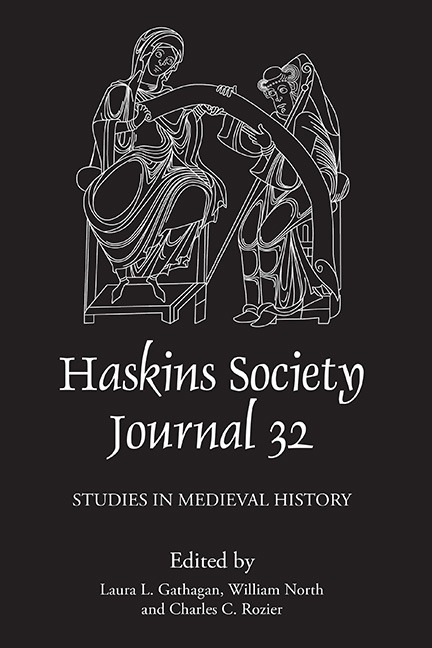Book contents
- Frontmatter
- Contents
- List of Illustrations
- Editors’ Note
- Abbreviations
- 1 Nearly-Not Miracles of the Carolingian Era: A Hypothesis
- 2 Noble Fathers and Low-Status Daughters in the Eleventh Century: Rilint, libera, and Hiltigund, presbyterissa
- 3 The Norman Conquest of England, the Papacy, and the Papal Banner
- 4 Ostmen, Normans, or Norwegians? Names and Identities in the Irish Sea World c. 1100
- 5 The Origins of Administrative Lordship in Medieval Flanders: A Reassessment
- 6 Multiple Allegiance and Its Impact: England and Normandy, 1066–c. 1204
- 7 The Wiley Lecture: Monsters in Anglo-Norman Historiography; Two Notes on William of Newburgh’s Revenants
- 8 A Female King or a Good Wife and a Great Mother? Seals, Coins, and the Epitaphic Legacy of the Empress Matilda
- 9 Harangue or Homily? Walter Espec, Deuteronomy, and the Renewal of the Covenant in Aelred of Rievaulx’s Relatio de Standardo
- 10 Anger Management: Modeling Christian Kingship in Peter of Blois’s Dialogus
- 11 In His Name: Religion as Administrative Strategy in Thirteenth-Century Champagne (and Navarre?)
- 12 Warhorse Markets and Social Status of Combatants under Edward I of England, 1296–1307
10 - Anger Management: Modeling Christian Kingship in Peter of Blois’s Dialogus
Published online by Cambridge University Press: 19 May 2022
- Frontmatter
- Contents
- List of Illustrations
- Editors’ Note
- Abbreviations
- 1 Nearly-Not Miracles of the Carolingian Era: A Hypothesis
- 2 Noble Fathers and Low-Status Daughters in the Eleventh Century: Rilint, libera, and Hiltigund, presbyterissa
- 3 The Norman Conquest of England, the Papacy, and the Papal Banner
- 4 Ostmen, Normans, or Norwegians? Names and Identities in the Irish Sea World c. 1100
- 5 The Origins of Administrative Lordship in Medieval Flanders: A Reassessment
- 6 Multiple Allegiance and Its Impact: England and Normandy, 1066–c. 1204
- 7 The Wiley Lecture: Monsters in Anglo-Norman Historiography; Two Notes on William of Newburgh’s Revenants
- 8 A Female King or a Good Wife and a Great Mother? Seals, Coins, and the Epitaphic Legacy of the Empress Matilda
- 9 Harangue or Homily? Walter Espec, Deuteronomy, and the Renewal of the Covenant in Aelred of Rievaulx’s Relatio de Standardo
- 10 Anger Management: Modeling Christian Kingship in Peter of Blois’s Dialogus
- 11 In His Name: Religion as Administrative Strategy in Thirteenth-Century Champagne (and Navarre?)
- 12 Warhorse Markets and Social Status of Combatants under Edward I of England, 1296–1307
Summary
The end of the 1180s was a point of crisis for the reign of Henry II of England. The fall of Jerusalem to Saladin in 1187 sent shockwaves throughout Western Christendom. Closer to home, Henry was entrenched in war against his son Richard, who had joined forces with King Philip Augustus of France. In the midst of these conflicts, Peter of Blois, a cleric close to Henry's court, crafted a fictional dialogue between the king and an unnamed abbot. In the dialogue, the two men discuss Henry's anger, as the king defends his right to vengeance and ire, and the abbot gradually persuades him to practice patience, mercy, and penance instead. Why, in the midst of local and international conflict, did Peter choose to write a dialogue focused on the king's anger? His intervention fits into a genre of clerical advice on moral Christian kingship. But the dialogue's in-depth focus on anger sets it apart: this was a topic of significance for Henry II, a characteristic of his rule often commented upon by contemporary sources. For Peter, that anger was an opening to kingship itself, and it offered an opportunity to advise the king on important choices, particularly making peace with his enemies and joining the Third Crusade. If a debate about anger could not solve the serious problems of Henry's reign, it might at least help to transform Henry himself.
Written towards the end Henry II's life, Peter of Blois's Dialogus inter regem Henricum secundum et abbatem bonnevallis features Henry and an abbot of Bonneval debating the morality of anger and emotional strategies to combat it. The dialogue stands out among contemporary sources for the weight it gives to a lay perspective, allowing competing ideas about anger to unfold. The result is more than a theoretical critique of anger; it is a model of productive interaction between the king and a monastic counselor. Through his scripting of emotional management, Peter of Blois creates a model of Christian kingship built through counsel. This essay will explore how the form and content of the Dialogus present the transformation of ira as an arduous process, but one essential to good kingship. It is the very messiness of its management that makes anger a productive opening for building relationships between kings and their clerical advisors, thereby shaping kingship itself.
Information
- Type
- Chapter
- Information
- The Haskins Society Journal 32 2020 Studies in Medieval History , pp. 185 - 204Publisher: Boydell & BrewerPrint publication year: 2021
